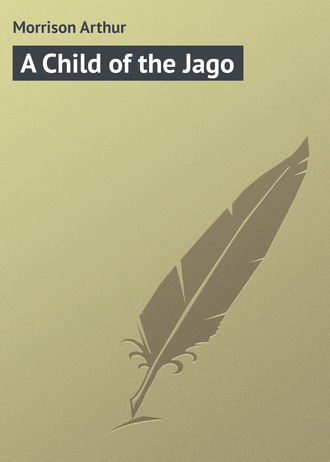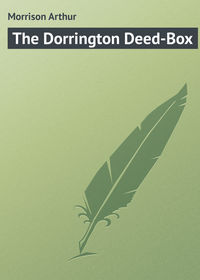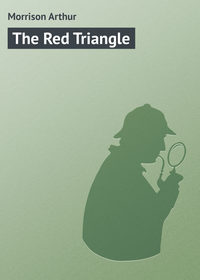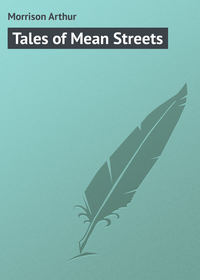 полная версия
полная версияA Child of the Jago
The baby turned feebly on its back, and set up a thin wail. Its eyes were large and bright, its tiny face was piteously flea-bitten and strangely old. 'Wy, she's 'ungry, mother,' said Dicky Perrott, and took the little thing up.
He sat on a small box, and rocked the baby on his knees, feeding it with morsels of chewed bread. The mother, dolefully inert, looked on and said: 'She's that backward I'm quite wore out; more 'n ten months old, an' don't even crawl yut. It's a never-endin' trouble, is children.'
She sighed, and presently stretched herself on the bed. The boy rose, and carrying his little sister with care, for she was dozing, essayed to look through the grimy window. The dull flush still spread overhead, but Jago Court lay darkling below, with scarce a sign of the ruinous back yards that edged it on this and the opposite sides, and nothing but blackness between.
The boy returned to his box, and sat. Then he said: 'I don't s'pose father's 'avin' a sleep outside, eh?'
The woman sat up with some show of energy. 'Wot?' she said sharply. 'Sleep out in the street like them low Ranns an' Learys? I should 'ope not. It's bad enough livin' 'ere at all, an' me being used to different things once, an' all. You ain't seen 'im outside, 'ave ye?'
'No, I ain't seen 'im: I jist looked in the court.' Then, after a pause: 'I 'ope 'e's done a click,' the boy said.
His mother winced. 'I dunno wot you mean, Dicky,' she said, but falteringly. 'You – you're gittin' that low an' an' – '
'Wy, copped somethink, o' course. Nicked somethink. You know.'
'If you say sich things as that I'll tell 'im wot you say, an' 'e'll pay you. We ain't that sort o' people, Dicky, you ought to know. I was alwis kep' respectable an' straight all my life, I'm sure, an' – '
'I know. You said so before, to father – I 'eard: w'en 'e brought 'ome that there yuller prop – the necktie pin. Wy, where did 'e git that? 'E ain't 'ad a job for munse and munse: where's the yannups come from wot's bin for to pay the rent, an' git the toke, an' milk for Looey? Think I dunno? I ain't a kid. I know.'
'Dicky, Dicky! you mustn't say sich things!' was all the mother could find to say, with tears in her slack eyes. 'It's wicked an' – an' low. An' you must alwis be respectable an' straight, Dicky, an' you'll – you'll git on then.'
'Straight people's fools, I reckon. Kiddo Cook says that, an' 'e's as wide as Broad Street. W'en I grow up I'm goin' to git toffs' clo'es an' be in the 'igh mob. They does big clicks.'
'They git put in a dark prison for years an' years, Dicky – an' – an' if you're sich a wicked low boy, father 'll give you the strap – 'ard,' the mother returned, with what earnestness she might. 'Gimme the baby, an' you go to bed, go on; 'fore father comes.'
Dicky handed over the baby, whose wizen face was now relaxed in sleep, and slowly disencumbered himself of the ungainly jacket, staring at the wall in a brown study. 'It's the mugs wot git took,' he said, absently. 'An' quoddin' ain't so bad.' Then, after a pause, he turned and added suddenly: 'S'pose father'll be smugged some day, eh, mother?'
His mother made no reply, but bent languidly over the baby, with an indefinite pretence of settling it in a place on the bed. Soon Dicky himself, in the short and ragged shirt he had worn under the jacket, burrowed head first among the dingy coverings at the foot, and protruding his head at the further side, took his accustomed place crosswise at the extreme end.
The filthy ceiling lit and darkened by fits as the candle-wick fell and guttered to its end. He heard his mother rise and find another fragment of candle to light by its expiring flame, but he lay still wakeful. After a time he asked: 'Mother, why don't you come to bed?'
'Waitin' for father. Go to sleep.'
He was silent for a little. But brain and eyes were wide awake, and soon he spoke again. 'Them noo 'uns in the front room,' he said. 'Ain't the man give 'is wife a 'idin' yut?'
'No.'
'Nor yut the boy – 'umpty-backed 'un?'
'No.'
'Seems they're mighty pertickler. Fancy theirselves too good for their neighbours; I 'eard Pigeony Poll say that; on'y Poll said – '
'You mustn't never listen to Pigeony Poll, Dicky. Ain't you 'eard me say so? Go to sleep. 'Ere comes father.' There was, indeed, a step on the stairs, but it passed the landing, and went on to the top floor. Dicky lay awake, but silent, gazing upward and back through the dirty window just over his head. It was very hot, and he fidgeted uncomfortably, fearing to turn or toss lest the baby should wake and cry. There came a change in the hue of the sky, and he watched the patch within his view, until the red seemed to gather in spots, and fade a spot at a time. Then at last there was a tread on the stairs, that stayed at the door; and father had come home. Dicky lay still, and listened.
'Lor, Josh, where ye bin?' Dicky heard his mother say. 'I'm almost wore out a-waitin'.'
'Awright, awright' – this in a hoarse grunt, little above a whisper. 'Got any water up 'ere? Wash this 'ere stick.'
There was a pause, wherein Dicky knew his mother looked about her in vacant doubt as to whether or not water was in the room. Then a quick, undertoned scream, and the stick rattled heavily on the floor. 'It's sticky!' his mother said. 'O my Gawd, Josh, look at that – an' bits o' 'air, too!' The great shadow of an open hand shot up across the ceiling and fell again. 'O Josh! O my Gawd! You ain't, 'ave ye? Not – not – not that?'
'Not wot? Gawblimy, not what? Shutcher mouth. If a man fights, you're got to fight back, ain' cher? Any one 'ud think it was a murder, to look at ye. I ain't sich a damn fool as that. 'Ere – pull up that board.'
Dicky knew the loose floor-board that was lifted with a slight groaning jar. It was to the right of the hearth, and he had shammed sleep when it had been lifted once before. His mother whimpered and cried quietly. 'You'll git in trouble, Josh,' she said. 'I wish you'd git a reg'lar job, Josh, like what you used – I do – I do.'
The board was shut down again. Dicky Perrott through one opened eye saw the sky a pale grey above, and hoped the click had been a good one: hoped also that it might bring bullock's liver for dinner.
Out in the Jago the pale dawn brought a cooler air and the chance of sleep. From the paving of Old Jago Street sad grey faces, open-mouthed, looked upward as from the Valley of Dry Bones. Down by Jago Row the coshed subject, with the blood dry on his face, felt the colder air, and moved a leg.
II
Three-quarters of a mile east of the Jago's outermost limit was the East End Elevation Mission and Pansophical Institute: such was the amazing success whereof, that a new wing had been built, and was now to be declared open by a Bishop of great eminence and industry.
The triumphs of the East End Elevation Mission and Pansophical Institute were known and appreciated far from East London, by people who knew less of that part than of Asia Minor. Indeed, they were chiefly appreciated by these. There were kept, perpetually on tap for the aspiring East Ender, the Higher Life, the Greater Thought, and the Wider Humanity: with other radiant abstractions, mostly in the comparative degree, specifics all for the manufacture of the Superior Person. There were many Lectures given on still more subjects. Pictures were borrowed and shown, with revelations to the Uninformed of the morals ingeniously concealed by the painters. The Uninformed were also encouraged to debate and to produce papers on literary and political matters, while still unencumbered with the smallest knowledge thereof: for the Enlargement of the Understanding and the Embellishment of the Intellect. And there were classes, and clubs, and newspapers, and games of draughts, and musical evenings, and a brass band, whereby the life of the Hopeless Poor might be coloured, and the Misery of the Submerged alleviated. The wretches who crowded to these benefits were tradesmen's sons, small shop-keepers and their families, and neat clerks, with here and there a smart young artisan of one of the especially respectable trades. They freely patronised the clubs, the musical evenings, the brass band, and the bagatelle board; and those who took themselves seriously debated and Mutually-Improved with pomp. Others, subject to savage fits of wanting-to-know, made short rushes at random evening classes, with intervals of disgusted apathy. Altogether, a number of decently-dressed and mannerly young men passed many evenings at the Pansophical Institute in harmless pleasures, and often with an agreeable illusion of intellectual advance.
Other young men, more fortunately circumstanced, with the educational varnish fresh and raw upon them, came from afar, equipped with a foreign mode of thought and a proper ignorance of the world and the proportions of things, as Missionaries. Not without some anxiety to their parents, they plunged into the perilous deeps of the East End, to struggle – for a fortnight – with its suffering and its brutishness. So they went among the tradesmen's sons and the shopmen, who endured them as they endured the nominal subscription; and they came away with a certain relief, and with some misgiving as to what impression they had made, and what they had done to make it. But it was with knowledge and authority that they went back among those who had doubted their personal safety in the dark region. The East End, they reported, was nothing like what it was said to be. You could see much worse places up West. The people were quite a decent sort, in their way: shocking Bounders, of course; but quite clean and quiet, and very comfortably dressed, with ties and collars and watches.
But the Missionaries were few, and the subscribers to the Elevation Mission were many. Most had been convinced, by what they had been told, by what they had read in charity appeals, and perhaps by what they had seen in police-court and inquest reports, that the whole East End was a wilderness of slums: slums packed with starving human organisms without minds and without morals, preying on each other alive. These subscribers visited the Institute by twos and threes, on occasions of particular festivity among the neat clerks, and were astonished at the wonderful effects of Pansophic Elevation on the degraded classes, their aspect and their habits. Perhaps it was a concert where nobody was drunk: perhaps a little dance where nobody howled a chorus, nor wore his hat, nor punched his partner in the eye. It was a great marvel, whereunto the observers testified: so that more subscriptions came, and the new wing was built.
The afternoon was bright, and all was promising. A small crowd of idlers hung about the main door of the Institute, and stared at a string of flags. Away to the left stood the new wing, a face of fair, clean brick; the ornamentation, of approved earnestness, in terra-cotta squares at regular intervals. Within sat many friends and relations of the shopmen and superior mechanics, and waited for the Bishop; the Eminences of the Elevation Mission sitting apart on the platform. Without, among the idlers, waited Dicky Perrott. His notions of what were going on were indistinct, but he had a belief, imbibed through rumour and tradition, that all celebrations at such large buildings were accompanied by the consumption, in the innermost recesses, of cake and tea. Even to be near cake was something. In Shoreditch High Street was a shop where cake stood in the window in great slabs, one slab over another, to an incalculable value. At this window – against it, as near as possible, his face flattened white – Dicky would stand till the shop-keeper drove him off: till he had but to shut his eyes to see once more, in the shifting black, the rich yellow sections with their myriad raisins. Once a careless errand-boy, who had bought a slice, took so clumsy a bite as he emerged that near a third of the whole piece broke and fell; and this Dicky had snatched from the paving and bolted with, ere the owner quite saw his loss. This was a superior sort of cake, at a penny. But once he had managed to buy himself a slice of an inferior sort for a halfpenny, in Meakin Street.
Dicky Perrott, these blessed memories in his brain, stood unobtrusively near the door, with the big jacket buttoned over as decently as might be, full of a desperate design: which was to get inside by whatsoever manner of trick or opportunity he might, and so, if it were humanly possible, to the cake.
The tickets were being taken at the door by an ardent young Elevator – one of the missionaries. Him, and all such washed and well-dressed people, Dicky had learnt to hold in serene contempt when the business in hand was dodging. There was no hurry: the Elevator might waste his vigilance on the ticket-holders for some time yet. And Dicky knew better than to betray the smallest sign of a desire for entrance while his enemy's attention was awake.
Carriages drew up, and yielded more Eminences: toward the end the Bishop himself, whom Dicky observed but as a pleasant-looking old gentleman in uncommon clothes; and on whom he bestowed no more thought than a passing wonder at what might be the accident to his hat which had necessitated its repair with string.
But at the spikes of the Bishop's carriage came another; and out of that there got three ladies, friends of the ticket-receiver, on whom they closed, greeting and shaking hands; and in a flash Dicky Perrott was beyond the lobby and moving obscurely along the walls of the inner hall, behind pillars and in shadow, seeking cake.
The Choral Society sang their lustiest, and there were speeches. Eminences expressed their surprise and delight at finding the people of the East End, gathered in the Institute building, so respectable and clean, thanks to persistent, indefatigable, unselfish Elevation.
The good Bishop, amid clapping of hands and fluttering of handkerchiefs, piped cherubically of everything. He rejoiced to see that day, whereon the helping hand of the West was so unmistakably made apparent in the East. He rejoiced also to find himself in the midst of so admirably typical an assemblage – so representative, if he might say so, of that great East End of London, thirsting and crying out for – for Elevation: for that – ah – Elevation which the more fortunately circumstanced denizens of – of other places, had so munificently – laid on. The people of the East End had been sadly misrepresented – in popular periodicals and in – in other ways. The East End, he was convinced, was not so black as it was painted. (Applause.) He had but to look about him. Etcetera, etcetera. He questioned whether so well-conducted, morally-given, and respectable a gathering could be brought together in any West End parish with which he was acquainted. It was his most pleasant duty on this occasion – and so on and so forth.
Dicky Perrott had found the cake. It was in a much smaller room at the back of the hall, wherein it was expected that the Bishop and certain Eminences of the platform would refresh themselves with tea after the ceremony. There were heavy, drooping curtains at the door of this room, and deep from the largest folds the ratling from the Jago watched. The table was guarded by a sour-faced man – just such a man as drove him from the window of the cake shop in Shoreditch High Street. Nobody else was there yet, and plainly the sour-faced man must be absent or busy ere the cake could be got at.
There was a burst of applause in the hall: the new wing had been declared open. Then there was more singing, and after that much shuffling and tramping, for everybody was free to survey the new rooms on the way out; and the Importances from the platform came to find the tea.
Filling the room and standing about in little groups; chatting, munching, and sipping, while the sour-faced man distractedly floundered amid crockery: not a soul of them all perceived an inconsiderable small boy, ducking and dodging vaguely among legs and round skirts, making, from time to time, a silent snatch at a plate on the table: and presently he vanished altogether. Then the amiable Bishop, beaming over the tea-cup six inches from his chin, at two courtiers of the clergy, bethought him of a dinner engagement, and passed his hand downward over the rotundity of his waistcoat.
'Dear, dear,' said the Bishop, glancing down suddenly, 'why – what's become of my watch?'
There hung three inches of black ribbon, with a cut end. The Bishop looked blankly at the Elevators about him.
Three streets off, Dicky Perrott, with his shut fist deep in his breeches pocket, and a gold watch in the fist, ran full drive for the Old Jago.
III
There was nobody in chase; but Dicky Perrott, excited by his novel exploit, ran hard: forgetting the lesson first learnt by every child of the Jago, to avoid, as far as may be, suspicious flight in open streets. He burst into the Old Jago from the Jago Row corner, by Meakin Street; and still he ran. A small boy a trifle bigger than himself made a sharp punch at him as he passed, but he took no heed. The hulking group at the corner of Old Jago Street, ever observant of weaklings with plunder, saw him, and one tried to catch his arm, but he had the wit to dodge. Past the Jago Court passage he scudded, in at the familiar doorway, and up the stairs. A pale hunchbacked child, clean and wistful, descended, and him Dicky flung aside and half downstairs with 'Git out, 'ump!'
Josh Perrott sat on the bed, eating fried fish from an oily paper; for it was tea-time. He was a man of thirty-two, of middle height and stoutly built, with a hard, leathery face as of one much older. The hair about his mouth seemed always three days old – never much less nor much more. He was a plasterer – had, at least, so described himself at police-courts. But it was long since he had plastered, though he still walked abroad splashed and speckled, as though from an eruption of inherent plaster. In moments of pride he declared himself the only member of his family who had ever learned a trade, and worked at it. It was a long relinquished habit, but while it lasted he had married a decent boiler-maker's daughter, who had known nothing of the Jago till these latter days. One other boast Josh Perrott had: that nothing but shot or pointed steel could hurt him. And this, too, was near being a true boast; as he had proved in more than one fight in the local arena – which was Jago Court. Now he sat peaceably on the edge of the bed, and plucked with his fingers at the oily fish, while his wife grubbed hopelessly about the cupboard shelves for the screw of paper which was the sugar-basin.
Dicky entered at a burst. 'Mother – father – look! I done a click! I got a clock – a red 'un!'
Josh Perrott stopped, jaw and hand, with a pinch of fish poised in air. The woman turned, and her chin fell. 'O, Dicky, Dicky,' she cried, in real distress, 'you're a awful low, wicked boy. My Gawd, Josh, 'e – 'e'll grow up bad: I said so.'
Josh Perrott bolted the pinch of fish, and sucked his fingers as he sprang to the door. After a quick glance down the stairs he shut it, and turned to Dicky. 'Where d'je get that, ye young devel?' he asked, and snatched the watch.
'Claimed it auf a ol' bloke w'en 'e was drinkin' 'is tea,' Dicky replied, with sparkling eyes. 'Let's 'ave a look at it, father.'
'Did 'e run after ye?'
'No – didn't know nuffin' about it. I cut 'is bit o' ribbin with my knife.' Dicky held up a treasured relic of blade and handle, found in a gutter. 'Ain' cher goin' to let's 'ave a look at it?'
Josh Perrott looked doubtfully toward his wife: the children were chiefly her concern. Of her sentiments there could be no mistake. He slipped the watch into his own pocket, and caught Dicky by the collar.
'I'll give you somethink, you dam young thief,' he exclaimed, slipping off his belt. 'You'd like to have us all in stir for a year or two, I s'pose; goin' thievin' watches like a growed-up man.' And he plied the belt savagely, while Dicky, amazed, breathless and choking, spun about him with piteous squeals, and the baby woke and puled in feeble sympathy.
There was a rip, and the collar began to leave the old jacket. Feeling this, Josh Perrott released it, and with a quick drive of the fist in the neck sent Dicky staggering across the room. Dicky caught at the bed frame, and limped out to the landing, sobbing grievously in the bend of his sleeve.
It was more than his mother had intended, but she knew better than to attempt interference. Now that he was gone, she said, with some hesitation: ''Adn't you better take it out at once, Josh?'
'Yus, I'm goin',' Josh replied, turning the watch in his hand. 'It's a good 'un – a topper.'
'You – you won't let Weech 'ave it, will ye, Josh? 'E – 'e never gives much.'
'No bloomin' fear. I'm goin' up 'Oxton with this 'ere.'
Dicky sobbed his way down the stairs and through the passage to the back. In the yard he looked for Tommy Rann, to sympathise. But Tommy was not, and Dicky paused in his grief to reflect that perhaps, indeed, in the light of calm reason, he would rather cast the story of the watch in a more heroic mould, for Tommy's benefit, than was compatible with tears and a belted back. So he turned and squeezed through a hole in the broken fence, sobbing again, in search of the friend that shared his inmost sorrows.
The belting was bad – very bad. There was broken skin on his shins where the strap had curled round, and there was a little sticky blood under the shirt half way up his back: to say nothing of bruises. But it was the hopeless injustice of things that shook him to the soul. Wholly unaided, he had done, with neatness and credit, a click that anybody in the Jago would have been proud of. Overjoyed, he had hastened to receive the commendations of his father and mother, and to place the prize in their hands, freely and generously, though perhaps with some hope of hot supper by way of celebration. And his reward was this. Why? He could understand nothing: could but feel the wrong that broke his heart. And so, sobbing, he crawled through two fences to weep on the shaggy neck of Jerry Gullen's canary.
Jerry Gullen's canary was no bird, but a donkey: employed by Jerry Gullen in his occasional intervals of sobriety to drag a cranky shallow, sometimes stored with glass bottles, rags, and hearth-stone: sometimes with firewood manufactured from a convenient hoarding, or from the joinery of an empty house: sometimes with empty sacks covering miscellaneous property suddenly acquired and not for general inspection. His vacations, many and long, Jerry Gullen's canary spent, forgotten and unfed, in Jerry Gullen's back-yard: gnawing desperately at fences, and harrowing the neighbourhood with his bray. Thus the nickname, facetiously applied by Kiddo Cook in celebration of his piteous song, grew into use; and 'Canary' would call the creature's attention as readily as a mouthful of imprecations.
Jerry Gullen's canary was gnawing, gnawing, with a sound as of a crooked centre-bit. Everywhere about the foul yard, ten or twelve feet square, wood was rounded and splintered and bitten white, and as the donkey turned his heavy head, a drip of blood from his gums made a disc on the stones. A twitch of the ears welcomed Dicky, grief-stricken as he was; for it was commonly thus that he bethought him of solace in Jerry Gullen's back-yard. And so Dicky, his arms about the mangy neck, told the tale of his wrongs till consolation came in composition of the heroic narrative designed for Tommy Rann.
'O, Canary, it is a blasted shame!'
IV
When Dicky Perrott came running into Jago Row with the Bishop's watch in his pocket, another boy punched a fist at him, and at the time Dicky was at a loss to guess the cause – unless it were a simple caprice – but stayed neither to inquire nor to retaliate. The fact was that the Ranns and the Learys were coming out, fighting was in the air, and the small boy, meeting another a trifle smaller, punched on general principles. The Ranns and the Learys, ever at war or in guarded armistice, were the great rival families – the Montagues and the Capulets – of the old Jago. The Learys indeed, scarce pretended to rivalry – rather to factious opposition. For the Ranns gloried in the style and title of the 'Royal Family,' and dominated the Jago; but there were mighty fighters, men and women, among the Learys, and when a combat arose it was a hard one and an animated. The two families ramified throughout the Jago; and under the Rann standard, whether by kin or by custom, were the Gullens, the Fishers, the Spicers, and the Walshes; while in the Leary train came Dawsons, Greens, and Harnwells. So that near all the Jago was wont to be on one side or the other, and any of the Jago which was not, was apt to be the worse for it; for the Ranns drubbed all them that were not of their faction in the most thorough and most workmanlike manner, and the Learys held by the same practice; so that neutrality meant double drubbing. But when the Ranns and Learys combined, and the Old Jago issued forth in its entire might against Dove Lane, then the battle was one to go miles to see.






